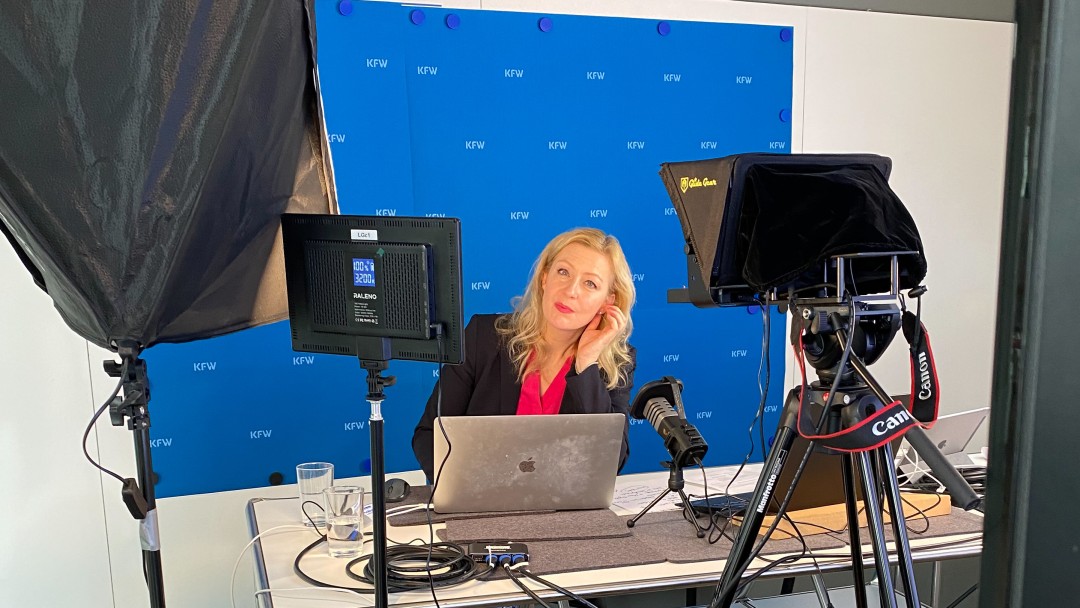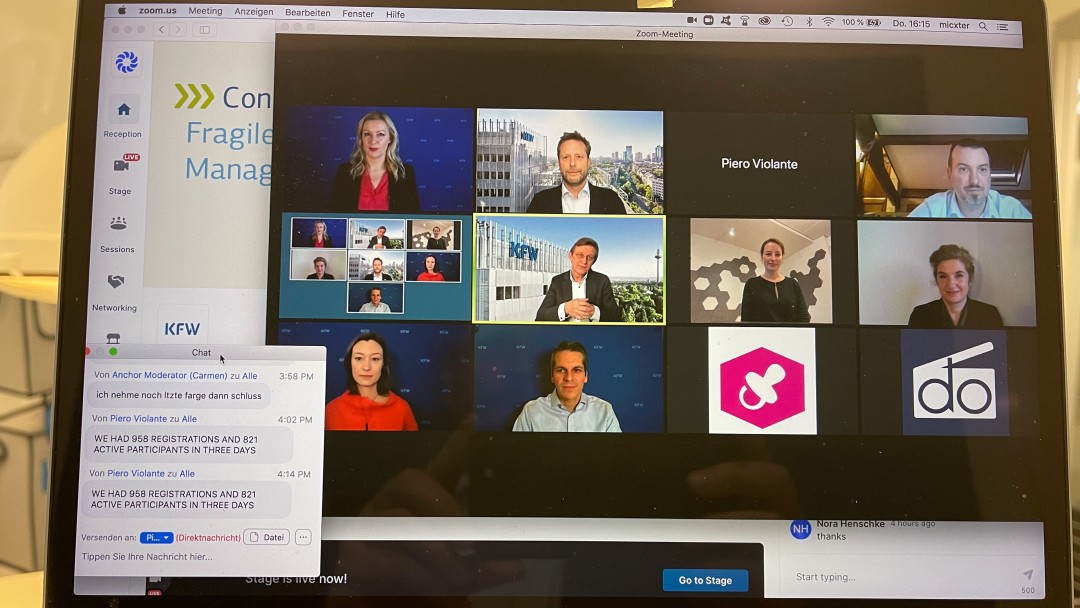News from 2021-01-28 / KfW Development Bank
Working "remotely" offers enormous opportunities for development cooperation
Conference of BMZ and KfW: Cooperating with partners "remotely"

More than 800 participants from all over the world attended the conference "Fragile Contexts, Digitalisation, Remote Management, Monitoring and Verification" organised by the German Federal Ministry for Economic Cooperation and Development (BMZ) and KfW in mid-January 2021, which was held online due to Corona. It presented opportunities for development cooperation to plan, manage, monitor and evaluate projects remotely. The COVID 19 pandemic has caused the need for such solutions to grow by leaps and bounds. What new paths does this open up for development cooperation?
"Working in fragile contexts is the new normal," explained Stephan Opitz, member of KfW Development Bank's Management Committee. "The experience gained in remotely managing projects in fragile countries now helps to implement projects also in times of Corona with the given travel restrictions."
What has so far been necessary primarily in countries like Afghanistan, Yemen or southern Somalia, that is, remote management, monitoring and evaluation, will be used much more in the future. KfW Development Bank is also testing the possibilities of remote management, monitoring and verification (RMMV) in rooms set up specifically for this purpose, the RMMV labs. It has been gathering its experience since 2018 in the RMMV manual, which will be updated and published later this year.
Enormous opportunities
"RMMV in fragile contexts is less about what we do and more about how we do it," said Prof Claudia Warning, Head of Division Asia, Southeast and Eastern Europe, Middle East, Latin America, Civil Society and Churches at the German Federal Ministry for Economic Cooperation and Development (BMZ). "The urgent question is: How can we remain capable of action and reduce risks, while at the same time improving the impact of our projects?" The BMZ's digitalisation strategy is a high priority in the 2030 Agenda.
The conference presented a wealth of new methods to enable and facilitate RMMV. KfW, for example, presented the "OSCAR" platform, a geo-information system for the health sector. OSCAR has already been implemented for Nepal, it shows the coverage of hospitals, their equipment with health personnel and currently the incidence of the COVID 19 pandemic. The system can be adapted for other countries within a few months. It is deliberately designed as an open source solution to allow interested programmers to further develop it.

KfW's RMMV manual
KfW experts Maja Bott, Marlene Schild and Michael Gruber presented KfW's RMMV manual, which is currently being thoroughly revised. It provides assistance in thinking about RMMV methods as early as the design stage of a project or even in initial discussions with partner governments. Projects typically involve a wide range of actors, from clients to partner government ministries, consultants, other donors and representatives of the target group. The clear definition of terms and tools in the new RMMV manual will facilitate dialogue between these stakeholders. The discussion at the conference showed that questions are still open. How does RMMV affect the cost of a project? How can the temptation of micro-management be resisted? How can data redundancy be avoided? How can the data of the target groups be protected?
The wealth of solutions presented by donors, development banks, foundations, the private sector, academia and non-governmental organisations at the conference shows the dynamism with which RMMV is currently being advanced. The analysis of satellite data, monitoring via smartphone apps and artificial intelligence enable unimagined insights into the project regions. This creates a new transparency in the progress and impact of development projects. In two further expert workshops, various chapters of the manual were examined in greater depth. In addition, all interested parties were invited to comment on the updated manual before its publication.
In a virtual fair, organisations such as the European Space Agency (ESA), Oxfam and others showed their tools and methods for RMMV.
Observe data security
Despite all the euphoria about the technical possibilities, the principle of "do no harm" remains to be considered. Ann-Kathrin Bregovic of Arqaam Monitoring and Evaluation emphasised the ethical framework of RMMV. First and foremost, she said, the consent of all participants must be obtained, after thorough information about what data will be collected and for what purpose. The data must be encrypted and securely stored and transmitted. "Behind every unit of data is a human being," Brego said.
In this context, Andreas Foerster, BMZ Head of Division for Digitisation in Development Cooperation, reminded the audience that when designing a project, it is important to consider from the outset which data are actually needed for a specific project objective and how they can be collected and analysed as efficiently as possible. He introduced various BMZ lighthouse projects, such as the online learning platform atingi, and presented the dashboard that provides an overview of the quality and quantity of the ministry's digitisation projects. The future of development cooperation is data-driven, Foerster predicted.
Creating trust
Lionel Bodin of Accenture Development Partnerships warned against a "recolonisation" of developing countries by the Western world's use of data. "There is no easy answer." He expects an increased merging of analogue and digital realities.
"RMMV will fundamentally change the way we work," said Stephan Opitz in closing remarks to the conference, in which participants engaged in lively online voting and chats. "We will be closer to the beneficiaries through these technologies. RMMV is an investment to set up better quality and even more effective projects for these people - no matter how remote their homes may be."

Share page
To share the content of this page with your network, click on one of the icons below.
Note on data protection: When you share content, your personal data is transferred to the selected network.
Data protection
Alternatively, you can also copy the short link: https://www.kfw-entwicklungsbank.de/s/enzBWrMC.CaBA
Copy link Link copied